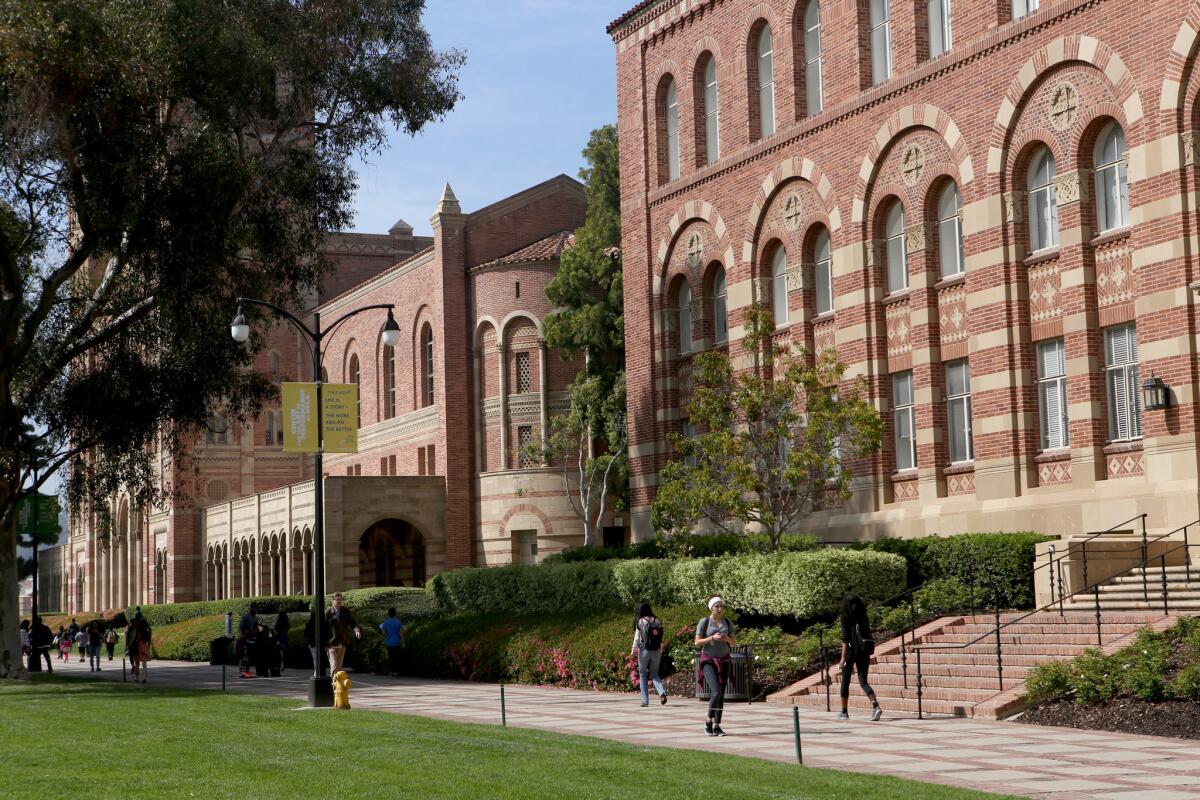Cancer drug discovered by UCLA sets off takeover fight among biotech companies

A high-priced prostate cancer drug discovered at UCLA is at the center of a multibillion-dollar takeover battle that has several giant pharmaceutical firms eyeing the purchase of San Francisco biotech firm Medivation.
Medivation sells the drug Xtandi for about $129,000 a year. Earlier this year, two nonprofit groups asked the federal government to allow other companies to sell the drug at lower prices. The groups argued that the federal government had a right under the law to allow lower-priced competition because UCLA scientists had used taxpayer-funded grants to discover Xtandi.
Late last month, the government turned down the nonprofits’ requests, ensuring that Medivation would continue to hold its monopoly on Xtandi and heightening the big drug companies’ interest in the fast-growing biotech firm.
On Tuesday, Medivation said it had entered into confidentiality agreements with “a number” of parties, including Sanofi, a French pharmaceutical giant that has been aggressively pursuing the biotech firm for months.
Sanofi made an initial bid of $9.3 billion, or $52.50 per share, for Medivation in April. When Medivation rejected that offer, Sanofi embarked on a campaign to try to oust the company’s board of directors.
Confidentiality agreements allow companies to review an acquisition target’s private information and are a step toward negotiating a deal. Medivation earlier signed confidentiality agreements with Pfizer and Celgene, according to Reuters.
“Our decision to enter into these agreements is consistent with our focus on stockholder interests, and will allow interested parties to fully understand the significant value of our Xtandi franchise and the enormous potential of our pipeline,” said Kim Blickenstaff, chairman of Medivation’s board of directors.
Medivation also said its board had “unanimously rejected” a new unsolicited bid from Sanofi that offered $58 per share in cash plus an additional $3 per share in contingent payments tied to future sales of one of the firm’s experimental breast cancer treatments.
The takeover battle shows how lucrative the market for new cancer treatments has become as companies charge prices that would be enough to buy a home in some areas of the country. Insurance or government programs like Medicare often pay much of the cost for the patient, but the prices are quickly adding to the nation’s overall healthcare bill.
See the most-read stories in Business this hour »
Spending on cancer medicines in the U.S. increased by 18% in 2015, to $39 billion, according to IMS Health, a consulting firm that collects data for the drug industry.
Medivation sells Xtandi in partnership with Japan’s Astellas Pharma.
Work on the drug began at UCLA in the early 2000s when Charles Sawyers, then a professor of medicine at the university as well as an investigator at the Howard Hughes Medical Institute, identified why prostate cancer may fail to respond to first-generation cancer drugs.
Sawyers set up a collaboration with Michael Jung, a UCLA biochemistry professor, who, with his team, designed and synthesized Xtandi.
In 2005, UCLA licensed the experimental drug’s patent to Medivation. The FDA approved Xtandi in 2012.
In March, UCLA, Sawyers, Jung and the other scientists involved sold their rights to Xtandi for a cash payment of $1.14 billion and potential additional payments based on the drug’s future sales.
It was the largest such deal involving a UC invention.
UCLA received about 44% of the proceeds, or $520 million, which is being used to support additional biotech research as well as undergraduate scholarships and graduate student fellowships.
Sawyers, Jung and six other researchers shared equally in the proceeds from their 37.5% stake in the drug. The remaining stake of about 19% was owned by the Howard Hughes Medical Institute, which helped fund Sawyers’ work.
Sawyers is now at Memorial Sloan Kettering Cancer Center in New York.
The two nonprofit groups that challenged Xtandi’s patent — Knowledge Ecology International and the Union for Affordable Cancer Treatment — say they plan to appeal last month’s decision by the National Institutes of Health to continue to allow Medivation to solely sell Xtandi. They also plan to refile the case with the next president’s administration.
Medivation’s shares closed at $62.33 on Wednesday, up 57 cents.
ALSO
Op-Ed: How race-based affirmative action could return to UC
UCLA, UC Berkeley boost admissions of Californians, including blacks and Latinos
California lawmakers create a University of California research center on gun violence







